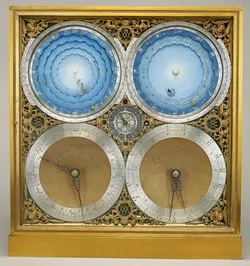Samuel Watson
Samuel Watson (c.1635-1710) was amongst the earliest watch and clock makers in Coventry.
Known for his work on astronomical clocks, Samuel Watson was born around 1635. His skill as a watchmaker was sufficiently well known by the 1680s for him to receive two commissions for clocks from King Charles II, and to be appointed “Mathematician in Ordinary” to the king in 1882. The second of these clocks, which survives in the royal collection, is a testament to his craftmanship. This astronomical clock has five dials, and its mechanism incorporates planetary motion for the five then-known planets, as well as lunar and solar motions and calendrical information. One dial shows the Metonic cycle, with its hand taking a full nineteen years to complete one rotation. A broadside print showing the clock is in the collection of the British Museum. This masterpiece took Watson a full seven years to complete from 1683 to 1690, an interval perhaps extended by his appointment as Sheriff of Coventry in 1686.
Watson relocated to London in the interval c.1690 – 1712, becoming a brother of the Clockmakers Company. He continued to make both table and astronomical clocks – at least two of which were made for Sir Isaac Newton, and also show astronomical dials. These are now in the possession of the Clockmakers Company and housed at the Science Museum.
In later life Watson retired to Coventry, and he appears to have died in the city in 1723.
Sources:
Pendulum Print blog on Samuel Watson, 26 Aug 2020. Accessed: Jan 2022.
Coventry Society article, March 2019.
Pedestal astronomical clock in Science Museum collection.

